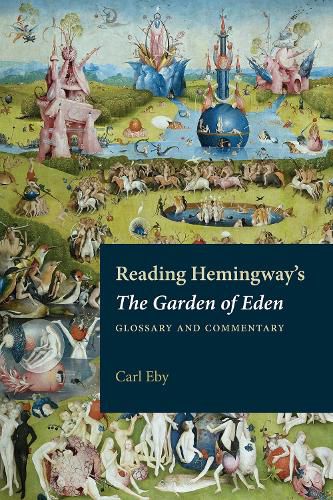Readings Newsletter
Become a Readings Member to make your shopping experience even easier.
Sign in or sign up for free!
You’re not far away from qualifying for FREE standard shipping within Australia
You’ve qualified for FREE standard shipping within Australia
The cart is loading…






Close reading and analysis of Hemingway's most ambitious posthumous novel
Published in 1986, Ernest Hemingway's novel The Garden of Eden is a literary landmark. Hemingway periodically worked on the novel from 1946 until his death in 1961, and the result is a complex novel that explores the origins and uses of creativity and grapples with issues of gender, sexuality, and race. Set in the 1920s, a young American writer, David Bourne, and his wife, Catherine, test the heteronormative expectations of their time through nighttime experiments with gender identity and when they both fall in love with the same woman.
In Reading Hemingway's The Garden of Eden, Carl P. Eby examines Hemingway's original unrevised manuscript in relation to Scribner's highly edited edition. The product of 30 years of research, this volume is the first to clarify for readers which parts of the original work had been retained, altered, and discarded in the publisher's text. No other treatment of the text has been so thorough in its analysis and annotations. This volume gives the Scribner's edition and the original manuscript equal consideration, helping readers to better understand the relationship between both versions of the novel.
Reading Hemingway's The Garden of Eden will be an essential text in Hemingway criticism, offering new, exciting insights into how the book was written, edited, and received by audiences.
$9.00 standard shipping within Australia
FREE standard shipping within Australia for orders over $100.00
Express & International shipping calculated at checkout
Close reading and analysis of Hemingway's most ambitious posthumous novel
Published in 1986, Ernest Hemingway's novel The Garden of Eden is a literary landmark. Hemingway periodically worked on the novel from 1946 until his death in 1961, and the result is a complex novel that explores the origins and uses of creativity and grapples with issues of gender, sexuality, and race. Set in the 1920s, a young American writer, David Bourne, and his wife, Catherine, test the heteronormative expectations of their time through nighttime experiments with gender identity and when they both fall in love with the same woman.
In Reading Hemingway's The Garden of Eden, Carl P. Eby examines Hemingway's original unrevised manuscript in relation to Scribner's highly edited edition. The product of 30 years of research, this volume is the first to clarify for readers which parts of the original work had been retained, altered, and discarded in the publisher's text. No other treatment of the text has been so thorough in its analysis and annotations. This volume gives the Scribner's edition and the original manuscript equal consideration, helping readers to better understand the relationship between both versions of the novel.
Reading Hemingway's The Garden of Eden will be an essential text in Hemingway criticism, offering new, exciting insights into how the book was written, edited, and received by audiences.